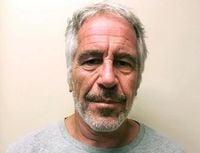On a brisk Wednesday morning in late September 2025, a towering 12-foot bronze statue depicting former President Donald Trump and the late financier Jeffrey Epstein holding hands was quietly removed from its spot outside the U.S. Capitol. The removal, carried out by U.S. Park Police, came despite the statue’s permit allowing it to remain on the National Mall until Sunday evening. According to The New York Times, officials cited the statue’s “out of compliance” status and invoked regulations that allow for such displays to be taken down if the applicant is notified at least 24 hours in advance—a rule that was followed in this instance.
The statue, which appeared almost overnight on the east end of the National Mall, was no subtle installation. Three bronze plaques adorned its base, one reading: “We celebrate the long-lasting bond between President Donald J. Trump and his ‘closest friend,’ Jeffrey Epstein.” The piece was created in honor of Friendship Month, a fact noted on the permit issued by the National Park Service. The artist behind the provocative work remains a mystery, adding to the spectacle and controversy swirling around the installation.
Public reaction to the statue was swift and intense. Its arrival followed a wave of renewed scrutiny over Trump’s historic relationship with Epstein, which has been the subject of both media investigation and political theater. According to BBC and The Wall Street Journal, recent document releases and reporting have only added fuel to the fire. One particularly contentious point: an alleged letter from Trump to Epstein, included in Epstein’s 50th birthday book—a 238-page collection of lewd messages, drawings, and explicit pictures compiled by Ghislaine Maxwell. The letter, reportedly a poem superimposed over the silhouette of a naked woman and bearing Trump’s signature, was excerpted on one of the statue’s plaques: “We have certain things in common, Jeffrey. A pal is a wonderful thing. Happy Birthday – and may every day be another wonderful secret.”
The White House, for its part, has rejected any suggestion of a close friendship between Trump and Epstein. Press Secretary Karoline Leavitt was quick to refute Trump’s involvement in the birthday book, and a spokesperson issued a pointed statement: “Liberals are free to waste their money however they see fit – but it’s not news that Epstein knew Donald Trump, because Donald Trump kicked Epstein out of his club for being a creep. Democrats, the media, and the organization that’s wasting their money on this statue knew about Epstein and his victims for years and did nothing to help them while President Trump was calling for transparency and is now delivering on it with thousands of pages of documents.”
Trump himself has repeatedly denied the authenticity of the birthday letter, claiming his signature was forged and that he never wrote the poem at all. The Wall Street Journal article that first reported on the letter has become the subject of a $10 billion libel lawsuit filed by Trump against Rupert Murdoch and News Corp. Murdoch’s legal team has called the suit “an affront to the First Amendment” and argued in Miami federal court that the reporting was accurate and not defamatory. Trump, meanwhile, has used his Truth Social platform to denounce the article as part of a “decades-long method of lying” that he claims has damaged his reputation.
This latest episode is just one thread in a much larger tapestry of revelations and accusations involving Epstein’s social and political connections. On September 27, 2025, Congressional Democrats released a new batch of documents from the Epstein Estate, including phone message logs, flight manifests, financial ledgers, and daily schedules. According to the BBC, these records show that billionaire Elon Musk was invited to Epstein’s private island in December 2014, though it remains unclear if Musk ever visited. Musk has stated publicly that he declined the invitation. The logs also include a May 2000 flight manifest listing Prince Andrew among passengers traveling with Epstein and Ghislaine Maxwell from Teterboro, New Jersey, to West Palm Beach, Florida. Maxwell, convicted in 2021 of conspiring with Epstein to traffic underage girls, has loomed large in many of these documents.
Other prominent names surfaced in the files as well. The records reference a planned lunch with internet entrepreneur Peter Thiel in November 2017, a scheduled breakfast with former Trump advisor Steve Bannon in February 2019, and a tentative meeting with Microsoft founder Bill Gates in December 2014. Gates later told the BBC that meeting Epstein was “a mistake.” Importantly, none of the documents suggest that these individuals were aware of Epstein’s criminal activities, but their mere association has been enough to spark public debate and, in some cases, professional consequences.
The fallout from these revelations has been swift for some. Sarah, Duchess of York, was dropped by several charities after an email emerged in which she called Epstein a “supreme friend” and apologized for publicly disowning him—a message her spokesperson said was written after Epstein threatened to sue her for defamation. In the UK, British ambassador Peter Mandelson was removed by Prime Minister Keir Starmer after it was revealed he had sent messages to Epstein, referring to him as “my best pal” while Epstein was in jail awaiting sex trafficking charges.
As the political and legal battles rage on, calls for greater transparency have only grown louder. Sara Guerrero, spokesperson for the Democrats on the House Oversight Committee, urged Attorney General Pam Bondi to release more documents, stating, “It should be clear to every American that Jeffrey Epstein was friends with some of the most powerful and wealthiest men in the world. Every new document produced provides new information as we work to bring justice for the survivors and victims.” Republicans on the committee, meanwhile, have accused Democrats of “putting politics over victims” and have promised to release the full set of documents soon.
Beyond the headlines, the controversy has spilled into the streets and across the globe. The Trump-Epstein statue in Washington followed a series of public stunts, including a projection at Windsor Castle during Trump’s unprecedented second state visit to the United Kingdom, all designed to highlight the pair’s past relationship. While Trump once called Epstein a “terrific guy” in a 2002 interview with New York Magazine, he now insists their friendship ended in the mid-2000s and that he hadn’t spoken to Epstein for 15 years prior to Epstein’s 2019 arrest on sex trafficking charges.
In the end, the statue’s removal may have closed one chapter of this saga, but the questions and controversies surrounding Trump, Epstein, and a host of high-profile figures remain very much alive. As new documents continue to surface and both political sides maneuver for control of the narrative, the public’s search for truth—and accountability—shows no sign of abating.


